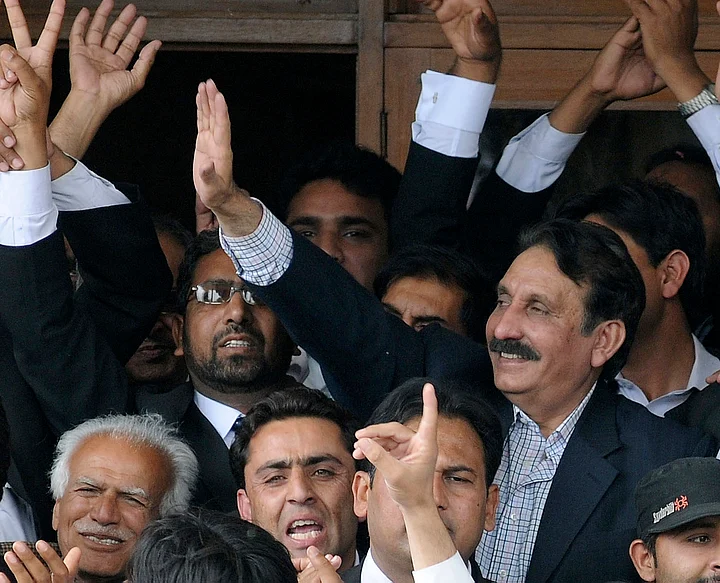In June this year, those seeking justice at the Calcutta High Court were confronted with a bizarre situation. The lawyers, who held their briefs, had gone on a strike. The reason: the sweltering heat was having a debilitating effect on their arguing capacity.
The judges were all ready to discharge their duty, but those seeking justice had to wait months before they got their day in court. Wouldn’t this obstruction of justice delivery, for the most appallingly banal of reasons, make anyone’s blood boil?
On the other hand, in October this year, the Bombay High Court introduced a strict procedure for vetting people before they would be allowed to argue their own cases. This has caused a flutter of indignation among a section of lawyers who believe that such checks place impossible hurdles in the path of access to justice, and are mulling a strike in protest.
The issue of lawyers’ strikes in India is poised at a confusing crossroad — on one side, the common man and judiciary are aghast at how many rogue lawyers hold the justice system to ransom.
The other side cites the example of criminal lawyers in Britain who went on a long strike to voice their protest against the government’s sharp cuts in legal aid, and contends that lawyers’ strikes serve a vital purpose and should not be completely outlawed.
Now, the Supreme Court, acting on a petition by activist lawyer Prashant Bhushan, is set to decide, once and for all, if lawyers should ever be allowed to boycott the courts, irrespective of their causes or grievances.

Angsty Lawyers’ Hooliganism, Obstruction of Justice
It is commonplace to hear about agitating lawyers going on the rampage — especially in courts like Delhi’s Tis Hazari, or recently, the Madras High Court. It does not seem to take long for a gathering of protesting lawyers to turn into a violent mob and bring the functioning of courts to a grinding halt. Sometimes, the police even have to lathi-charge the violent mob of lawyers.
Such strikes place a huge burden on those seeking justice. Think about the person arrested on false charges and languishing in police custody. If a strike is on, and the strikers prevent even non-protesting lawyers from appearing in court, who would represent him and argue for his fundamental right to liberty?
Or what about the plight of those who have approached courts to rescue them from municipalities’ impending and arbitrary demolitions of their dwellings ?
The mammoth pendency of cases and the way court dockets function ensures that every time a case gets adjourned, it takes almost three-and-a-half months to come up for the next hearing. Justice delayed is justice denied, so when lawyers hold up courts’ functioning, they are effectively obstructing the administration of justice.
No wonder, in 2002, the Supreme Court came down heavily on striking lawyers and ruled that those who go on strike and prevent others from arguing matters would be slapped with charges of criminal contempt.

When Lawyers’ Strikes Are Necessary
The Advocates Act clearly states that lawyers’ primary duty is to the court. There is a strongly held view that if lawyers put impediments in courts’ functioning, or delay their clients’ pursuit of justice, they are committing a grave infraction.
But lawyers owe a duty to the larger cause of justice as well, and that does not have a lower standing than the one owed to the court. The latter in fact, stands at a much higher footing, because the concept of justice is not limited to individual cases.
Going back to the Bombay High Court’s rule regarding the screening of people who want to argue their own case without a lawyer. What if the court refuses to roll back its decision which could effectively shut out many poor litigants from accessing justice? The legal aid system in India is free, but hardly effective. More often than not, an ordinary individual not schooled in the law stands greater chances of winning his case if he argues it himself, than letting a lawyer of dismal quality represent him in court.
Now, if some lawyers of the Bombay Bar go on a strike in protest, would they be obstructing justice?
Let’s consider another situation. In this interview, Delhi-based criminal lawyer and human rights defender Trideep Pais narrates how he and others were threatened and heckled by a group of lawyers only because they were defending terror suspects. Every accused, howsoever odious the allegations against them may be, has an inalienable right to legal representation. Now what if another group of conscientious lawyers go on a strike to demonstrate solidarity with their colleagues who were prevented from discharging their ethical obligation ?
Strikes remain a potent political weapon, and as the lawyers of Pakistan ably demonstrated in 2010, their protests and abstaining from work played a critical role in restoring the judiciary’s independence after General Pervez Musharraf’s Emergency in 2007.
Nobody is saying that unscrupulous lawyers who cripple the working of courts should go free. However, a blanket prohibition on lawyers’ strikes would not be in the interests of justice.
(At The Quint, we are answerable only to our audience. Play an active role in shaping our journalism by becoming a member. Because the truth is worth it.)
